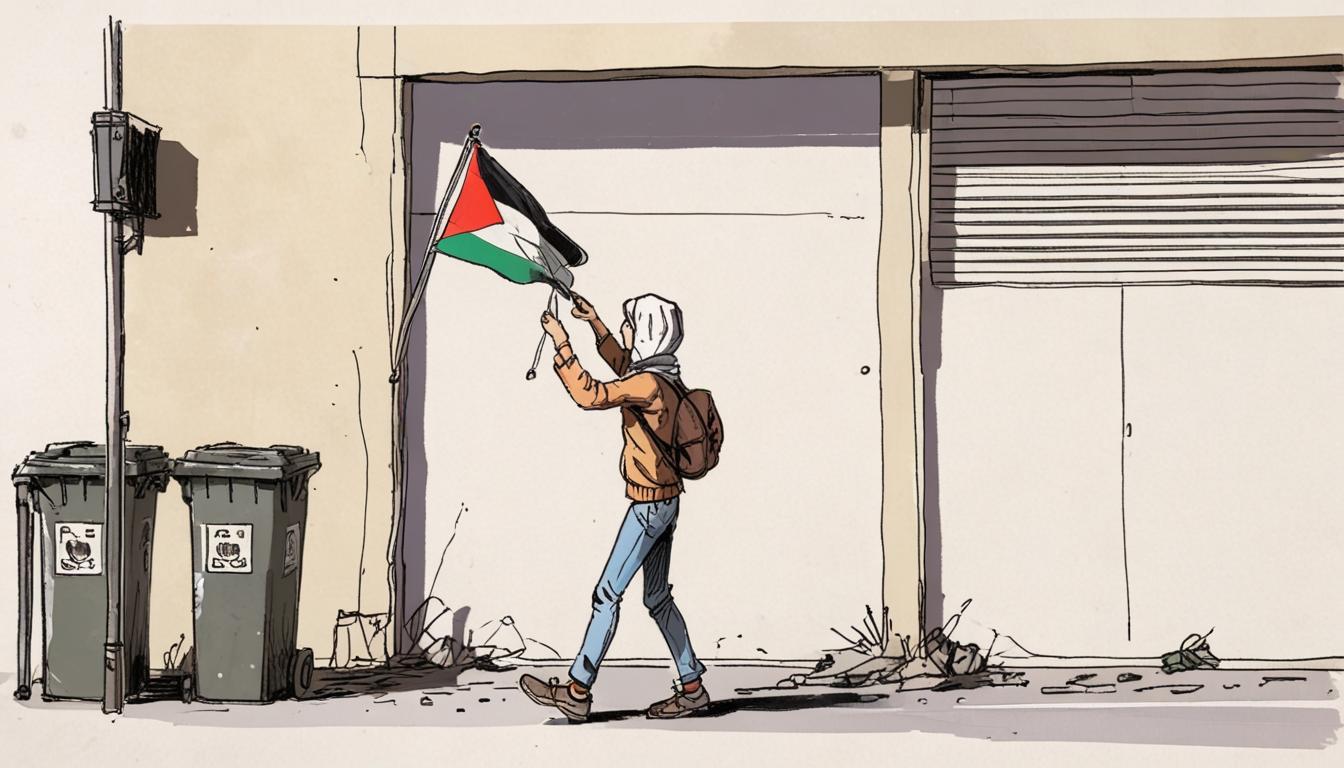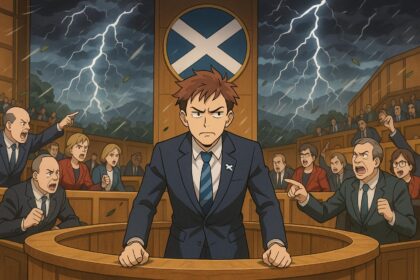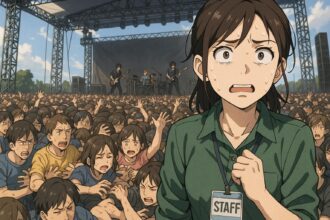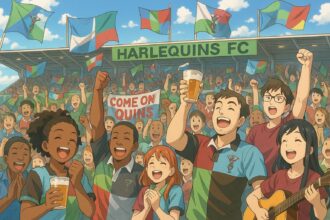Demonstrators in Belfast and Dublin stage protests calling on Irish broadcasters RTÉ and BBC to withdraw from Eurovision due to Israel’s involvement, accusing national broadcaster KAN of culturewashing amid the Gaza conflict. While broadcasters resist calls to pull out, political leaders urge engagement over boycott ahead of the contest in Switzerland.
Several pro-Palestinian demonstrators gathered recently outside the BBC studios in Belfast, expressing their discontent with the corporation’s coverage of the ongoing conflict in Gaza. As part of their protest, activists banged dustbin lids and called for a boycott of the Eurovision Song Contest, which is set to feature Israel, amidst claims of “culturewashing” by Israel’s national broadcaster, KAN. The Eurovision Song Contest will commence in Switzerland on May 13, with the grand final following on May 17.
The protest at BBC in Belfast mirrors a similar demonstration in Dublin, where scores of activists, including well-known actor Stephen Rea, assembled outside RTÉ’s headquarters. Attendees showcased Palestinian flags and held up banners with slogans such as “you can’t culturewash genocide.” Rea recited the poignant poem “If I Should Die” by Palestinian poet Refaat Alareer, who fell victim to an Israeli air strike, highlighting the emotional weight of the gathering.
Organised by the Ireland-Palestine Solidarity Campaign (IPSC), the Dublin protest aimed to urge RTÉ to withdraw from broadcasting the Eurovision contest in light of Israel’s inclusion. According to the IPSC, over 70 former Eurovision contestants have backed their calls to exclude Israel from the competition. During the demonstration, which also featured a mini-concert of anti-war songs, the chairwoman of the IPSC, Zoe Lawlor, drew parallels to Ireland’s historical stance against the apartheid regime in South Africa, stating, “It’s vital to exclude the genocidal apartheid state of Israel from this global cultural platform now.”
Despite the pressure from demonstrators, RTÉ’s director general, Kevin Bakhurst, confirmed that the broadcaster would not withdraw its entry, which features the Laika Party performing a song by singer Emmy. However, he expressed a desire to discuss Israel’s participation with the European Broadcasting Union (EBU), chaired by Irishman Noel Curran, indicating the complexities of the situation.
The response from political leaders has been mixed. Taoiseach Leo Varadkar has publicly opposed calls for an Irish boycott, arguing that such actions would not only be counterproductive but could potentially alienate liberal voices within Israel, undermining efforts toward peace. He emphasised the need for engagement rather than exclusion, advocating for a collaborative approach to promote human rights across the region.
This discourse around the Eurovision contest touches on broader themes of cultural representation and political dissent, revealing deep societal divides on issues of international solidarity. As the protests unfold, the stakes are not just about a music competition but reflect the ongoing discourse surrounding human rights, political expressions, and the intersection of culture and activism.
Reference Map
Source: Noah Wire Services
- https://www.irishnews.com/news/northern-ireland/eurovision-boycott-by-bbc-and-rte-and-called-for-in-belfast-and-dublin-protests-WGM4T72XDFJZ3BMAUNLBO474EI/ – Please view link – unable to able to access data
- https://www.irishtimes.com/ireland/2024/05/02/protesters-call-for-rte-to-boycott-eurovision-during-demonstration-outside-studios/ – On May 2, 2024, approximately 100 activists, musicians, and actors gathered outside RTÉ’s Donnybrook headquarters in Dublin to protest Israel’s participation in the Eurovision Song Contest. The demonstration featured chants, Palestinian and Irish flags, and a mini-concert. Actor Stephen Rea read the poem ‘If I Should Die’ by Palestinian poet Refaat Alareer. The Ireland-Palestine Solidarity Campaign (IPSC) called for RTÉ to withdraw from broadcasting the event, citing concerns over Israel’s actions in Gaza. RTÉ confirmed its intention to proceed with coverage, emphasizing the non-political nature of the contest. ([irishtimes.com](https://www.irishtimes.com/ireland/2024/05/02/protesters-call-for-rte-to-boycott-eurovision-during-demonstration-outside-studios/?utm_source=openai))
- https://www.rte.ie/news/ireland/2024/0502/1447061-eurovision-protest/ – On May 2, 2024, protesters gathered outside RTÉ headquarters in Donnybrook, Dublin, calling for a boycott of the Eurovision Song Contest due to Israel’s participation. The demonstration, organized by the Ireland-Palestine Solidarity Campaign (IPSC), included a ‘die-in’ by health workers and featured performances by artists such as Mary Coughlan and Liam Ó Maonlaí. IPSC spokesperson Zoe Lawlor emphasized the need to exclude Israel from the contest, drawing parallels to Ireland’s past stance against apartheid South Africa. RTÉ stated it would continue its coverage, highlighting the contest’s non-political nature. ([rte.ie](https://www.rte.ie/news/ireland/2024/0502/1447061-eurovision-protest/?utm_source=openai))
- https://www.irishexaminer.com/news/arid-41317984.html – In December 2023, Taoiseach Leo Varadkar expressed opposition to Ireland boycotting the Eurovision Song Contest over Israel’s participation. He argued that such a unilateral boycott would be counterproductive, stating it would ‘ostracise’ liberals within Israel and hinder efforts for peace. Varadkar emphasized the importance of engaging with all parties to promote human rights and a two-state solution. His comments came amid calls from various groups and politicians for Ireland to withdraw from the contest due to Israel’s involvement. ([irishtimes.com](https://www.irishtimes.com/politics/2023/12/25/varadkar-opposed-to-boycott-by-ireland-of-eurovision-over-israels-participation/?utm_source=openai))
- https://www.irishexaminer.com/news/arid-41296948.html – In December 2023, Taoiseach Leo Varadkar opposed calls for Ireland to boycott the Eurovision Song Contest over Israel’s participation. He stated that such a unilateral boycott would be counterproductive, potentially ‘ostracising’ liberals within Israel and hindering efforts for peace. Varadkar emphasized the importance of engaging with all parties to promote human rights and a two-state solution. His comments came amid calls from various groups and politicians for Ireland to withdraw from the contest due to Israel’s involvement. ([irishexaminer.com](https://www.irishexaminer.com/news/arid-41296948.html?utm_source=openai))
- https://www.irishtimes.com/politics/2023/12/25/varadkar-opposed-to-boycott-by-ireland-of-eurovision-over-israels-participation/ – In December 2023, Taoiseach Leo Varadkar opposed calls for Ireland to boycott the Eurovision Song Contest over Israel’s participation. He argued that such a unilateral boycott would be counterproductive, stating it would ‘ostracise’ liberals within Israel and hinder efforts for peace. Varadkar emphasized the importance of engaging with all parties to promote human rights and a two-state solution. His comments came amid calls from various groups and politicians for Ireland to withdraw from the contest due to Israel’s involvement. ([irishtimes.com](https://www.irishtimes.com/politics/2023/12/25/varadkar-opposed-to-boycott-by-ireland-of-eurovision-over-israels-participation/?utm_source=openai))
- https://www.irishtimes.com/ireland/2024/05/02/protesters-call-for-rte-to-boycott-eurovision-during-demonstration-outside-studios/ – On May 2, 2024, approximately 100 activists, musicians, and actors gathered outside RTÉ’s Donnybrook headquarters in Dublin to protest Israel’s participation in the Eurovision Song Contest. The demonstration featured chants, Palestinian and Irish flags, and a mini-concert. Actor Stephen Rea read the poem ‘If I Should Die’ by Palestinian poet Refaat Alareer. The Ireland-Palestine Solidarity Campaign (IPSC) called for RTÉ to withdraw from broadcasting the event, citing concerns over Israel’s actions in Gaza. RTÉ confirmed its intention to proceed with coverage, emphasizing the non-political nature of the contest. ([irishtimes.com](https://www.irishtimes.com/ireland/2024/05/02/protesters-call-for-rte-to-boycott-eurovision-during-demonstration-outside-studios/?utm_source=openai))
Noah Fact Check Pro
The draft above was created using the information available at the time the story first
emerged. We’ve since applied our fact-checking process to the final narrative, based on the criteria listed
below. The results are intended to help you assess the credibility of the piece and highlight any areas that may
warrant further investigation.
Freshness check
Score:
9
Notes:
The narrative discusses protests and events relating to the Eurovision Song Contest scheduled in May 2024, making it current as of early May 2024. References to contemporaneous figures such as RTÉ director general Kevin Bakhurst and Taoiseach Leo Varadkar, who are still in their roles as of 2024, support its freshness. There are no indications of recycled or outdated news, and the timing of the protest is recent with no signs of repurposed press releases.
Quotes check
Score:
8
Notes:
Direct quotes from individuals such as Zoe Lawlor and Taoiseach Leo Varadkar are consistent with statements covered in other reputable narratives from May 2024. The poem recited by Stephen Rea is attributed to Palestinian poet Refaat Alareer, a known figure recently reported killed. Earliest public reporting of these quotes appears contemporaneous with the protests, suggesting originality rather than recycled quotations.
Source reliability
Score:
8
Notes:
The narrative originates mostly from IrishNews.com, supported by references to other reputable Irish media like The Irish Times, RTÉ, and the Irish Examiner, all well-regarded outlets in Ireland. These publications have a solid track record of factual reporting on political and cultural events, lending credibility to the coverage.
Plausability check
Score:
9
Notes:
The claims about protests against the Eurovision contest due to Israel’s participation align with known political tensions and recent events surrounding the Israel-Gaza conflict in 2024. The involvement of public figures such as Stephen Rea and political commentary from Leo Varadkar fit expected reactions. The narrative’s depiction of cultural boycotts and activism is plausible and consistent with recent geopolitical activism.
Overall assessment
Verdict (FAIL, OPEN, PASS): PASS
Confidence (LOW, MEDIUM, HIGH): HIGH
Summary:
The narrative is current and reflects ongoing events around Eurovision 2024, with credible sourcing from established Irish media outlets. The quotations are timely and appear original to the period, and the described protests and political responses are plausible given the current geopolitical context. There is strong confidence in the narrative’s accuracy and freshness.













